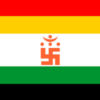Jainism is a religion of Indian origin, but with a minority following that may be the oldest example of an ascetic religion in the world, and does still exist today. It shares many concepts with Vedantism, also known as Vedic Hinduism, but differs in its emphasis on the individual and the sanctity of the individual soul. In this case, disqualifying itself, in a sense, as being a form of mysticism. It embraced tenants you may recognize, and actually was the originator of them. Perhaps inspiring the Buddha’s split from Vedantic Hinduism. As it is recorded, he did pursue asceticism.
It’s underlying teachings are simple, and all other are considered subordinate to it. The Buddhist eightfold path sharing the same basic dynamic, but with more elaborate explanation. First is the doctrine of “doing no harm“. Ahimsa they call it. Cattle are viewed as the living embodiments of ahimsa, and vegetarianism is a strong part of Jainist doctrine. Another is “do good“. In Jainism, as in Buddhism, there are sins of omission. But Jainism and most sects of Buddhism believe sin doesn’t lead to condemnation. It is just ill advised.
Jainism is very concerned with some metaphysical concepts differentiating itself from Buddhism in that way. It sees the realms of existence in a holistic way and has a doctrine of reincarnation. But all beings, called Jivas in their terms, are equal. A human incarnation is a unique opportunity in that it’s the living embodiment of the middle path. In their teaching you accumulate karma, but it isn’t a stain or moralism. Jainism is ultimately not a moralistic teaching. It is more a chain of cause and effect. A physical fact like having brown eyes. That is what karma is in Jainism.
If that is karma then how does the question of will come into it? Your will is what makes you generate karma. It’s an independent force, like air. You incorporate it into yourself by your association. By your attachments. By accumulating positive karma you cause yourself to be reborn as a type of Jiva called a Deva. Basically an angel who can do good, but cannot in that life achieve liberation. By accumulating negative karma you cause yourself to be reborn as a hell being. But these, like Devas, are unable to achieve moksha or liberation, and are no better or worse than the Devas.
Would this angel live upon the earth in a physical body? Well, Devas can be reborn. So yes, one can bear those traits as a human. However, Devas tend to serve the greater world as spirit guides, and the hell beings vent their anger both according to their nature. But there is no moralistic hierarchy in Jainism. They see your relating as a matter of personal responsibility. They see the human incarnation as a unique opportunity though all Jivas are equal, and thus the murder of a human being, even in the name of justice, is considered an atrocity. To my experience, those places that practice execution do seem to incur a negative karma.
Some feel life in prison for very bad crimes is enough punishment, and with life in prison the prisoner can still seek moksha or liberation. Liberation for the Jains isn’t liberty of the flesh. So imprisonment is not to Jainism necessarily unjust.
Your thoughts are welcome. Be well friends.
Travis Saunders
Dragon Intuitive
~science,mysticism,spirituality~



Leave a Reply